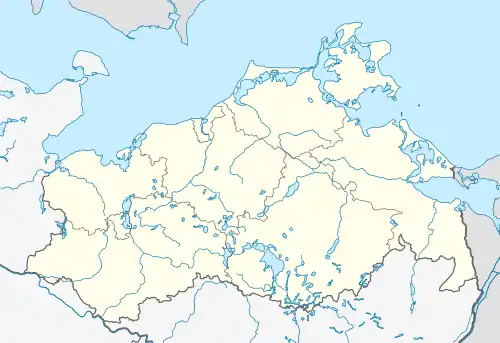Mirow
Mirow (German: [ˈmiːʁoː] (![]() listen)) is a town in the district of Mecklenburgische Seenplatte in southern Mecklenburg-Vorpommern, Germany.
listen)) is a town in the district of Mecklenburgische Seenplatte in southern Mecklenburg-Vorpommern, Germany.
Mirow | |
|---|---|
 Coat of arms | |
Location of Mirow within Mecklenburgische Seenplatte district  | |
 Mirow  Mirow | |
| Coordinates: 53°16′N 12°48′E | |
| Country | Germany |
| State | Mecklenburg-Vorpommern |
| District | Mecklenburgische Seenplatte |
| Municipal assoc. | Mecklenburgische Kleinseenplatte |
| Government | |
| • Mayor | Carlo Schmettau |
| Area | |
| • Total | 156.37 km2 (60.37 sq mi) |
| Elevation | 63 m (207 ft) |
| Population (2019-12-31)[1] | |
| • Total | 3,891 |
| • Density | 25/km2 (64/sq mi) |
| Time zone | UTC+01:00 (CET) |
| • Summer (DST) | UTC+02:00 (CEST) |
| Postal codes | 17252 |
| Dialling codes | 039833 |
| Vehicle registration | MST |
| Website | http://www.amt-mecklenburgische-kleinseenplatte.de/ |
Name (Etymology)
"Mir" in Slavonic languages means "peace" or "glory". The name "Mirow" was derived from "villa mirowe", translating as "location of peace".
Geography
Mirow lies in the middle of the Mecklenburg Lake District (Mecklenburgische Seenplatte) on the southern shore of Lake Mirow, which is connected to the Müritz and the Havel by a system of lakes, rivers, and canals. There are several more lakes on the territory of this municipality. The neighboring towns of Diemitz, Fleeth, Granzow, Peetsch, and Starsow were incorporated into the city in 2004 and are now part of the municipality.
City division
The following districts belong to the city of Mirow:[2]
|
|
|
In addition, the residential areas of Mirowdorf, Blankenfelde, Hohenfelde, Birkenhof, Holm, Forsthof, Weinberg, Niemannslust, Diemitzer Schleuse, Fleether Mühle, Kakeldütt, Schillersdorfer Teerofen and Hohe Brücke are parts of the city of Mirow.[3]
History
In 1227, the Order of Saint John founded a commandry on the shore of Lake Mirow after Lord Borwin II had given them land there; the first quarter of the coat-of-arms of the town still displays the cross of the Johanniterorden (the Order of Saint John) in commemoration of that gift. In 1701, the town became part of the duchy of Mecklenburg-Strelitz. In 1919, it gained town privileges. Mirow is the birthplace of Charlotte of Mecklenburg-Strelitz, Queen consort of George III of the United Kingdom.
The baroque palace, under construction from 1749 to 1760, was designed by Christoph Julius Löwe. It is notable for a ballroom with stucco decoration, and for the Red Salon lined with silk Chinese-style wallpaper. The English-style park of the palace includes the burial place of the last reigning Grand Duke of Mecklenburg-Strelitz, who died in 1918. The grand-ducal tomb is situated in the Gothic Church of Saint John, which was rebuilt after its complete destruction in 1945.[4]
Gallery
 Baroque and early Classicist Mirow Castle, standing on the Castle Island inside the lake Mirower See
Baroque and early Classicist Mirow Castle, standing on the Castle Island inside the lake Mirower See Bridge connecting Mirow's Castle Island to Love Island
Bridge connecting Mirow's Castle Island to Love Island Castle Church of Mirow
Castle Church of Mirow Boat houses at Mirower See
Boat houses at Mirower See

References
- "Statistisches Amt M-V – Bevölkerungsstand der Kreise, Ämter und Gemeinden 2019". Statistisches Amt Mecklenburg-Vorpommern (in German). July 2020.
- "Hauptsatzung der Stadt Mirow" (PDF). Amt Mecklenburgische Kleinseenplatte. Retrieved 12 June 2020.
- "Mirow (Mecklenburg)". GenWiki. Retrieved 12 June 2020.
- "Sights and attractions in and around Mirow".